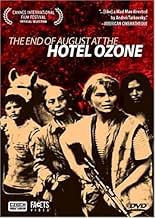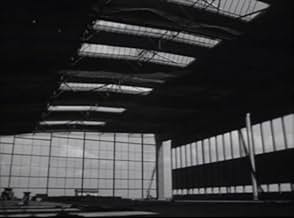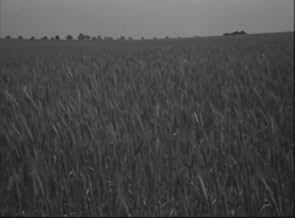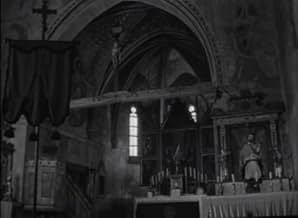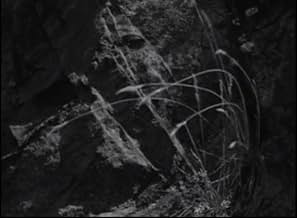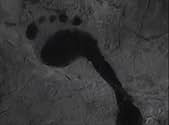IMDb RATING
6.6/10
679
YOUR RATING
A troupe of young women on post-apocalyptic earth are lead around by a mistress born before the war, eventually stumbling into the company of a lonely old man.A troupe of young women on post-apocalyptic earth are lead around by a mistress born before the war, eventually stumbling into the company of a lonely old man.A troupe of young women on post-apocalyptic earth are lead around by a mistress born before the war, eventually stumbling into the company of a lonely old man.
Featured reviews
I like the slow pace of the movie. Nothing happens for ages... And there's a lot of theatrical pathos. Nonetheless, what I like very much, is a kind of budget-wise method applied in the movie. Most of it happens in the open meadows - I suppose in some old abandoned army area somewhere in Czechoslovakia. Nothing much is shown, we can just guess.
I have to admit, the film is really interesting. It is one of those few sci-fi films which have been made within famous Czechoslovakian film industry. There are few more rare and interesting titles which I recommend to see. Try "Upír z Ferratu" = Vampire from Ferrat (funny quotation of the classical film horror icon "Nosferatu") - film from 80' from a Czech director Juraj Herz. Kind of weird biotech sport car movie about a racing car which sucks the driver's blood... Reminds David Cronenberg.
to hall 900: I just wanna mention, the old woman Martha, you like so much, is not called Ondřej Jariabek - he is the old man, but she is Jitka Hořejí.
I have to admit, the film is really interesting. It is one of those few sci-fi films which have been made within famous Czechoslovakian film industry. There are few more rare and interesting titles which I recommend to see. Try "Upír z Ferratu" = Vampire from Ferrat (funny quotation of the classical film horror icon "Nosferatu") - film from 80' from a Czech director Juraj Herz. Kind of weird biotech sport car movie about a racing car which sucks the driver's blood... Reminds David Cronenberg.
to hall 900: I just wanna mention, the old woman Martha, you like so much, is not called Ondřej Jariabek - he is the old man, but she is Jitka Hořejí.
It is 25 or so years after a nuclear war, and a few hardy young women, and an older leader, are wandering (in Czechoslovakia?) in search of canned food from before the war that can be safely eaten. No men apparently survive, being less resistant to radiation. They come across a mountain resort hotel, the Hotel Ozone, where an old man lives alone with a wind-up record player and old books and magazines. The young women, raised as barbarians, act the part. The person who introduced me to this chilling movie pointed out that science fiction movies were supposed to have monsters, and suggested looking for the monsters in this one. The B&W cinematography is great, especially in scenes of the women practicing their horseback riding skills and exploring a ruined town. You'll never be able to hear the tune "Roll Out the Barrel" the same way again.
This one heralds later works, Cormac Mccarthy's The Road and Michael Haneke's Time of the Wolf among them. It's a journey through a bleak barren landscape where characters are lost in it rather than found, set after an unspecified apocalypse that leaves the world an empty desolate place, not the end of the world like in an Emmerich film where destruction is an exciting spectacle to witness as but rather "an" end to the world, a hazy blur of abandonment filled with residues of mystery and nameless violence.
The film is a blank canvas. Distraught characters are violent and aimless. The land works by some other order. Where people like Herzog, Malick or Tarkovksy found things of spiritual importance to say on this other order, Schmidt's film is empty and distanced. When the film needs to be stark, animals are murdered for the camera, a dog is shot or a cow is slaughtered. The basic means of expression in The Road are poetic, here they are allegoric. As the characters of McCarthy's novel stagger starved and hopeless through the scorched macadam we can taste bitter ash in our mouths. Here they simply walk through shrubs. We don't fear for their souls, so to speak.
And then it gets interesting because the rugged band of amazons stumbles upon the ruins of an old hotel in the middle of the forest and there's an old man living there alone who sees in the young girls (all born after the apocalypse so they don't even have a word for "man" or "grammophone") a new future, new mothers for a new civilization of men. The first among the women, the leader, an old woman who was young before the apocalypse and can remember a time when "the cans didn't rust and the land didn't despise us", she doesn't allow herself to be dragged along on new hope, she is resigned to the end of times. The end is bleak and poignant, a hopeful future is not suggested, and the tiny pocket that preserves the civilization of the old world (where gramophones play music, where cows still make milk) is left behind to rot in the forest. What The End of August at the Hotel Ozone says about the communist regime of the time is at once vague enough to fool censors but clear in emotional duress.
This was a very interesting precursor to dystopian films that deal with the end of the world in sombre quiet terms. If it's not terribly successful it's because it's faintly groping in the dark where no one else had gone before, because it uses vague characters to sketch a very clear picture in allegory.
The film is a blank canvas. Distraught characters are violent and aimless. The land works by some other order. Where people like Herzog, Malick or Tarkovksy found things of spiritual importance to say on this other order, Schmidt's film is empty and distanced. When the film needs to be stark, animals are murdered for the camera, a dog is shot or a cow is slaughtered. The basic means of expression in The Road are poetic, here they are allegoric. As the characters of McCarthy's novel stagger starved and hopeless through the scorched macadam we can taste bitter ash in our mouths. Here they simply walk through shrubs. We don't fear for their souls, so to speak.
And then it gets interesting because the rugged band of amazons stumbles upon the ruins of an old hotel in the middle of the forest and there's an old man living there alone who sees in the young girls (all born after the apocalypse so they don't even have a word for "man" or "grammophone") a new future, new mothers for a new civilization of men. The first among the women, the leader, an old woman who was young before the apocalypse and can remember a time when "the cans didn't rust and the land didn't despise us", she doesn't allow herself to be dragged along on new hope, she is resigned to the end of times. The end is bleak and poignant, a hopeful future is not suggested, and the tiny pocket that preserves the civilization of the old world (where gramophones play music, where cows still make milk) is left behind to rot in the forest. What The End of August at the Hotel Ozone says about the communist regime of the time is at once vague enough to fool censors but clear in emotional duress.
This was a very interesting precursor to dystopian films that deal with the end of the world in sombre quiet terms. If it's not terribly successful it's because it's faintly groping in the dark where no one else had gone before, because it uses vague characters to sketch a very clear picture in allegory.
A group of women, perhaps the only female survivors of a nuclear holocaust, encounter an elderly man living in a decrepit hotel who has thoughts about rekindling the human race. Viewers are offered a sketchy time-line of the post-apocalyptic world (cleverly done using tree-rings) but little is said about the catastrophic events that led to the empty world other than the multi-lingual opening 'countdown motif' and a character's comment that leukemia was a common cause of death, hinting at atomic war. Life in the now desolate world seems bleak and aimless, as the increasingly feral girls wander in search of other people who may or may not exist. The imagery is imaginative at times, such as the image of a human footprint disappearing and the earth cracking after the opening countdowns. The cast and script is quite good (note: I watched a sub-titled version), and the black-and-white cinematography is stark and harsh: the final shot of the girls trudging along a high ridge, perhaps in a world now devoid of hope, is memorable. All in all: a post-apocalyptic tale with no action or adventure, just a bleak vision, a sad closure to our tenure. A CAVEAT: the film has several unpleasant scenes in which animals (a snake, a dog and a cow) are killed (or if they are not, the effects are extremely realistic).
There isn't much of a story line in this film. But the characters and atmosphere are very effective.
There is one somewhat disturbing, but brief, sequence where a nice looking German shepherd dog is killed. I think they just simulated it's death by catching one of it's legs in a humane trap, but the dog's piteous yelps are still very heart rending.
The rest of the movie is very good, especially towards the end when the group of women are staying at the nearly abandoned hotel.
In a way, this movie was very well structured, even though there isn't much of story. It starts out slow and sets a scene, and then the plot thickens fairly smoothly and progressively towards the end. And it has a really tremendous ending, but I don't want to reveal it.
And, of course, the best thing about this movie are the feral young Amazonian women.
I'd love to have a copy of this film. It's a pity that it's out of print.
There is one somewhat disturbing, but brief, sequence where a nice looking German shepherd dog is killed. I think they just simulated it's death by catching one of it's legs in a humane trap, but the dog's piteous yelps are still very heart rending.
The rest of the movie is very good, especially towards the end when the group of women are staying at the nearly abandoned hotel.
In a way, this movie was very well structured, even though there isn't much of story. It starts out slow and sets a scene, and then the plot thickens fairly smoothly and progressively towards the end. And it has a really tremendous ending, but I don't want to reveal it.
And, of course, the best thing about this movie are the feral young Amazonian women.
I'd love to have a copy of this film. It's a pity that it's out of print.
Did you know
- TriviaDana Medrická was originally considered for the part of Old Woman, eventually played by Beta Ponicanová.
- GoofsThe girls were born into a post-apocalyptic world, but at least one of them has a vaccination scar.
- ConnectionsEdited into CzechMate: In Search of Jirí Menzel (2018)
- How long is Late August at the Hotel Ozone?Powered by Alexa
Details
- Release date
- Country of origin
- Language
- Also known as
- Конец августа в отеле Озон
- Production company
- See more company credits at IMDbPro
- Runtime
- 1h 17m(77 min)
- Color
- Sound mix
- Aspect ratio
- 1.37 : 1
Contribute to this page
Suggest an edit or add missing content

